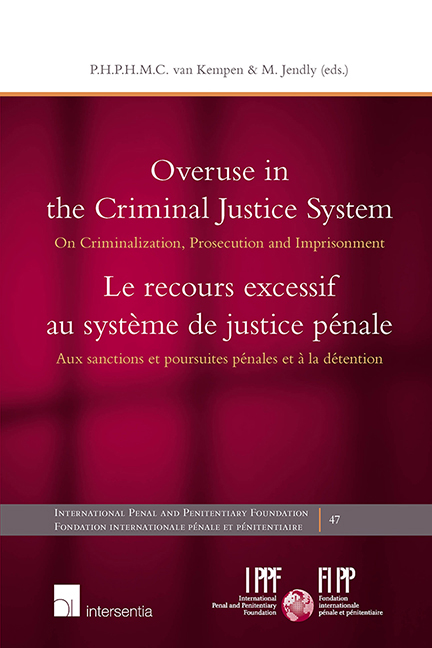Book contents
- Frontmatter
- Dedication
- Contents
- Acknowledgements
- Remerciements
- PART I INTRODUCTORY SYNTHESIS AND ANALYSES 1ÈRE PARTIE. SYNTHÈSE ET ANALYSES INTRODUCTIVES
- PART II THEMES 2ÈME PARTIE. THÈMES
- PART III NATIONAL REPORTS 3ÈME PARTIE. RAPPORTS NATIONAUX
- Overuse in the Criminal Justice System in Argentina
- Le recours au système de justice pénale en Belgique: état des lieux et perspectives
- Overuse of Criminal Law in Finland
- Overuse in the Criminal Justice System in Germany
- Overuse in the Criminal Justice System in Greece
- Overusing the Criminal Justice System: the Case of Ireland
- Overuse in the Criminal Justice System in Japan
- Tendencies of Overuse in Criminal Law Policy and Criminal Law Enforcement in the Netherlands
- Overuse in the Criminal Justice System in New Zealand
- Overuse in the Criminal Justice System in Nigeria
- Overuse in the Criminal Justice System in Poland
- Overuse in the Russian Criminal Justice System
- Overuse in the Criminal Justice System in Spain
- Recourt-on de manière excessive au système pénal en Suisse?
- Overuse of the Criminal Justice System in Taiwan
- Overuse and Underuse of the United States Criminal Justice System in the Area of Business Crimes
- The International Penal and Penitentiary Foundation: history and purpose
- La Fondation internationale pénale et pénitentiaire: histoire et objectif
- The IPPF Series
Overuse of the Criminal Justice System in Taiwan
from PART III - NATIONAL REPORTS 3ÈME PARTIE. RAPPORTS NATIONAUX
Published online by Cambridge University Press: 26 June 2019
- Frontmatter
- Dedication
- Contents
- Acknowledgements
- Remerciements
- PART I INTRODUCTORY SYNTHESIS AND ANALYSES 1ÈRE PARTIE. SYNTHÈSE ET ANALYSES INTRODUCTIVES
- PART II THEMES 2ÈME PARTIE. THÈMES
- PART III NATIONAL REPORTS 3ÈME PARTIE. RAPPORTS NATIONAUX
- Overuse in the Criminal Justice System in Argentina
- Le recours au système de justice pénale en Belgique: état des lieux et perspectives
- Overuse of Criminal Law in Finland
- Overuse in the Criminal Justice System in Germany
- Overuse in the Criminal Justice System in Greece
- Overusing the Criminal Justice System: the Case of Ireland
- Overuse in the Criminal Justice System in Japan
- Tendencies of Overuse in Criminal Law Policy and Criminal Law Enforcement in the Netherlands
- Overuse in the Criminal Justice System in New Zealand
- Overuse in the Criminal Justice System in Nigeria
- Overuse in the Criminal Justice System in Poland
- Overuse in the Russian Criminal Justice System
- Overuse in the Criminal Justice System in Spain
- Recourt-on de manière excessive au système pénal en Suisse?
- Overuse of the Criminal Justice System in Taiwan
- Overuse and Underuse of the United States Criminal Justice System in the Area of Business Crimes
- The International Penal and Penitentiary Foundation: history and purpose
- La Fondation internationale pénale et pénitentiaire: histoire et objectif
- The IPPF Series
Summary
INTRODUCTION
In Taiwan, some actions may have been unnecessarily criminalized at the legislative level, and extremely heavy punishments have been imposed on some offences. Furthermore, prosecutors do not have much power to decide whether or not to prosecute certain cases. Therefore, over-prosecution exists in Taiwan's criminal justice system. According to statistical data, overcrowding in prisons has been an issue for a long time. However, the Taiwanese government is aware of the problem and is taking measures to solve it by revising and enacting related statutes. This paper aims to address the problem concerning the overuse of the criminal justice system in Taiwan. In addition, the paper discusses how Taiwan is showing improvements in its attempt to resolve the problem at hand.
OVERUSE OF CRIMINALIZATION
THE ANNUAL NUMBER OF CRIMES
A total of 297,676 crimes occurred in 2015, which involved 270,817 offenders. In the same year, Taiwan's population was 23,492,074, indicating that 1,268.71 cases and 1,154.23 offenders existed per 100,000 people in Taiwan in 2015. From a long-term perspective (2000 to 2015), on average, a total of 423,302 cases (including 231,167 offenders) occurred annually. During that period, the average population was about 22,953,810. Thus, about 1,857.56 cases and 1,006.74 offenders existed per 100,000 Taiwanese annually, on average. The number of cases is greater than that of the offenders because one case means that an offender commits a crime. Therefore, when an offender commits two crimes, it adds up to two cases. The aforementioned data are further presented in Table 1.
One noteworthy observation from Table 1 is that the numbers of offenders have not evidently changed since 2007. In contrast, the number of cases show a consistent decreasing pattern. This means that the law and order situation in Taiwan has shown consistent improvement over the years.
TOP FIVE CRIMES IN TAIWAN
In the past few years, the top five crimes in Taiwan have been quite consistent. In 2014, among all cases sent by the police to the district prosecutor's offices, the most frequently occurring crimes were offences against public safety (10.7%), offences related to narcotics (6.3%), injury (5.0%), larceny (3.9%), and fraud (3.9%).
- Type
- Chapter
- Information
- Overuse in the Criminal Justice SystemOn Criminalization, Prosecution and Imprisonment, pp. 589 - 614Publisher: IntersentiaPrint publication year: 2019

